第09讲 非谓语动词-2025学年英语初升高知识详细讲解
文档属性
| 名称 | 第09讲 非谓语动词-2025学年英语初升高知识详细讲解 | 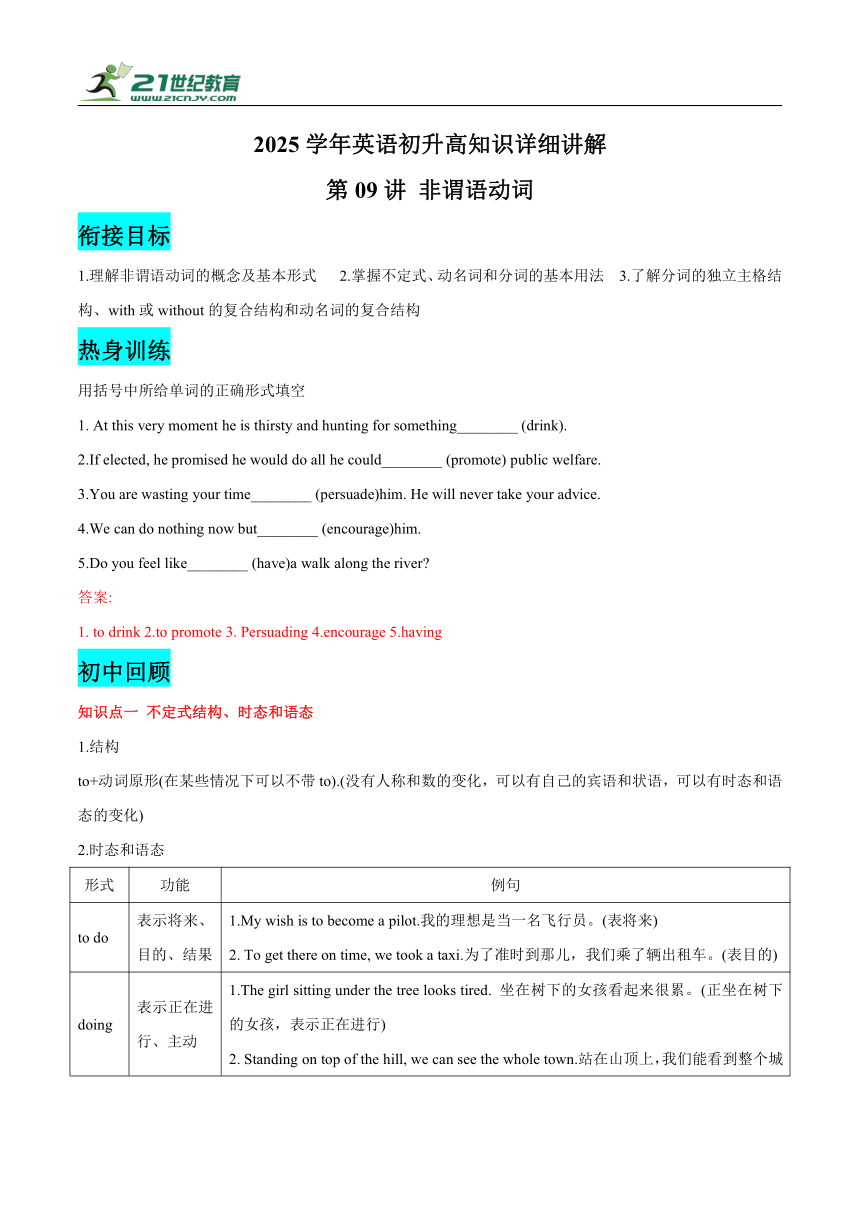 | |
| 格式 | docx | ||
| 文件大小 | 162.0KB | ||
| 资源类型 | 试卷 | ||
| 版本资源 | 人教新目标(Go for it)版 | ||
| 科目 | 英语 | ||
| 更新时间 | 2025-06-20 00:34:49 | ||
图片预览

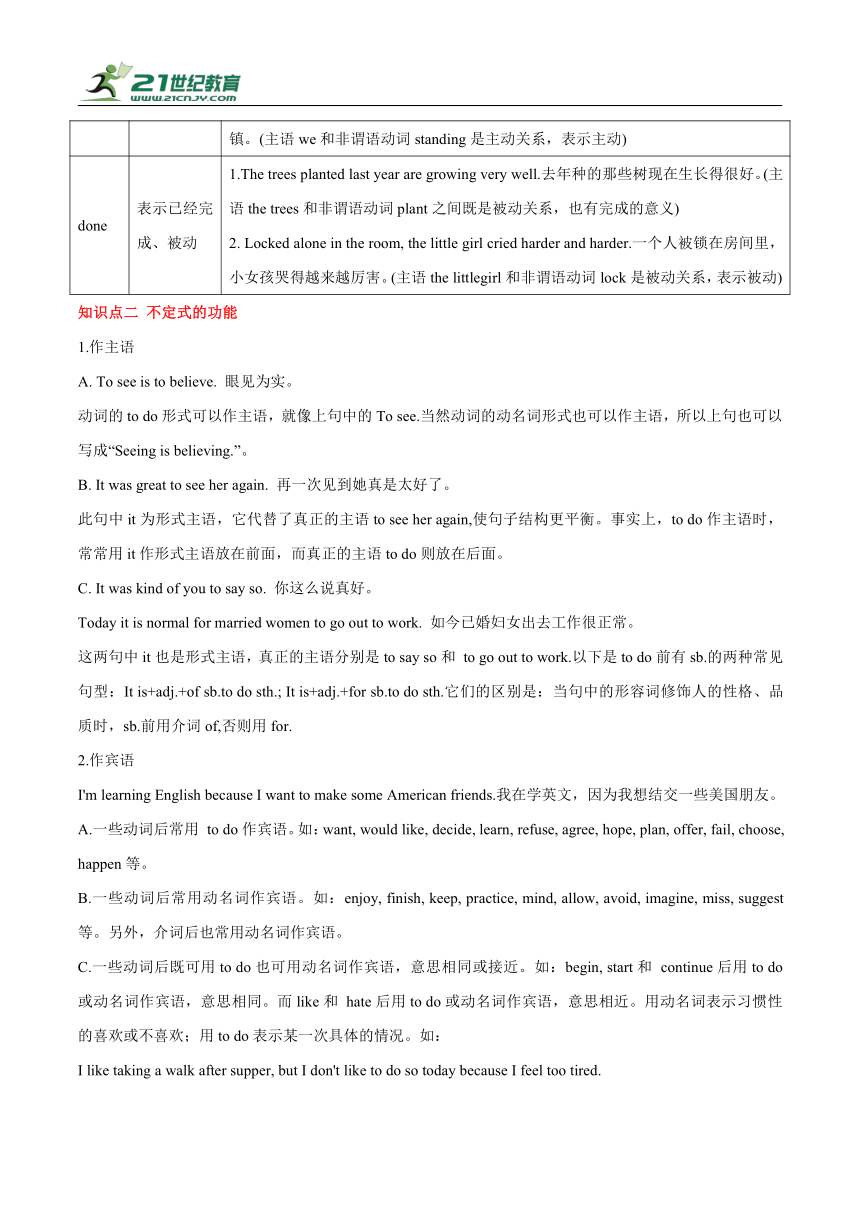
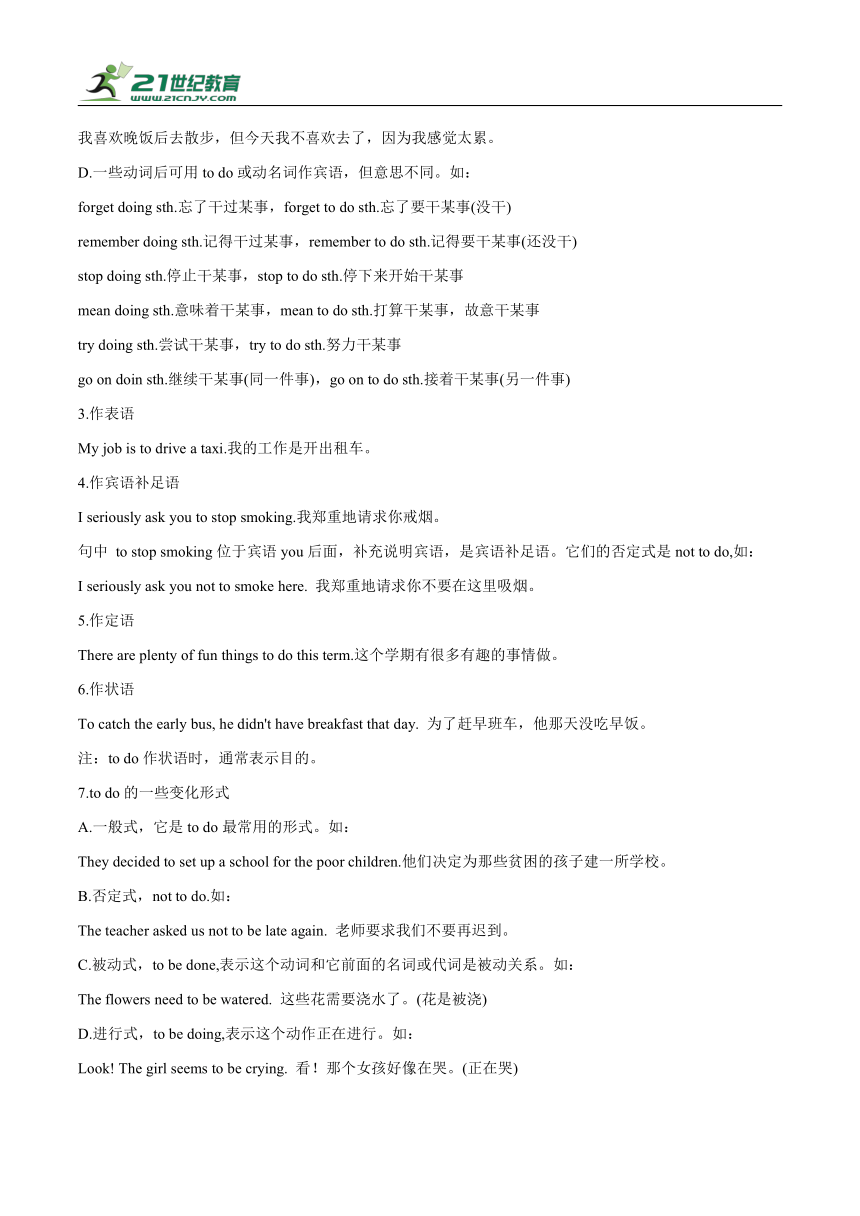
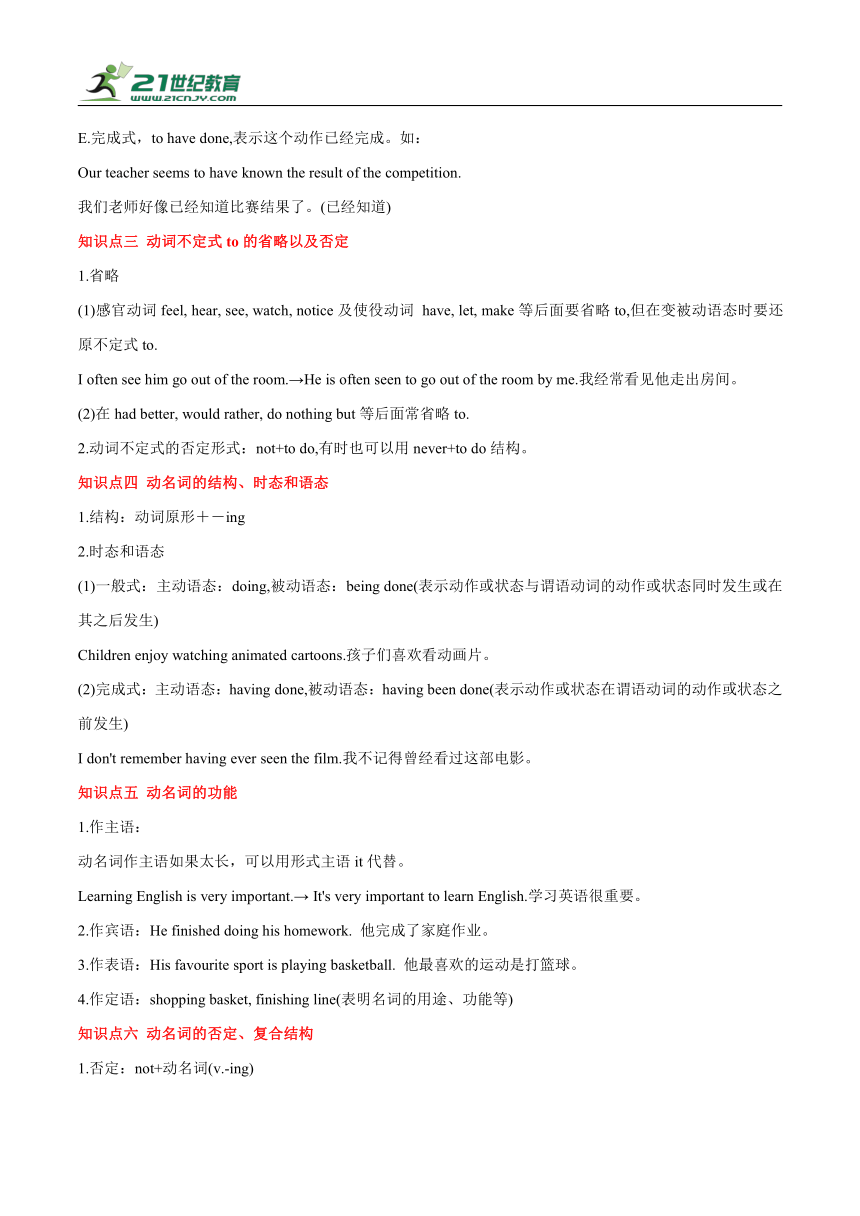
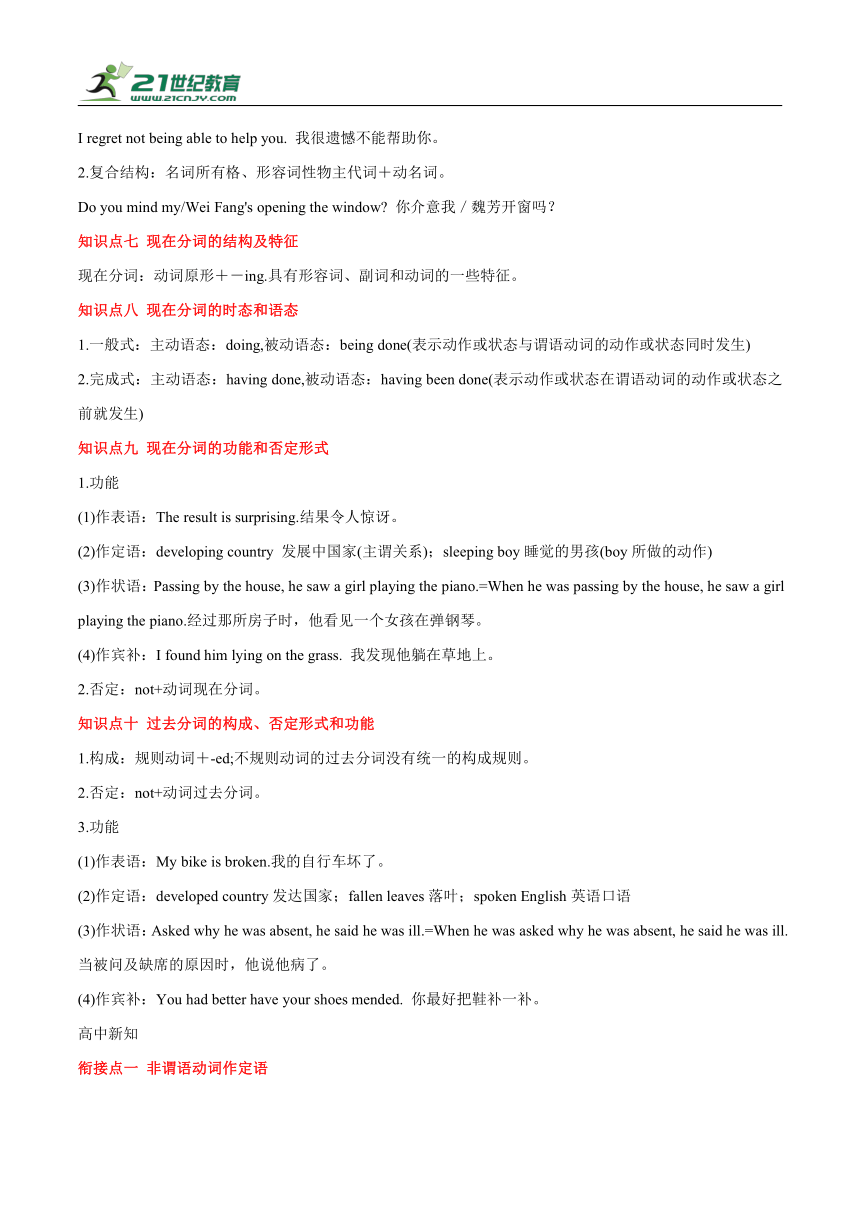
文档简介
2025学年英语初升高知识详细讲解
第09讲 非谓语动词
衔接目标
1.理解非谓语动词的概念及基本形式 2.掌握不定式、动名词和分词的基本用法 3.了解分词的独立主格结构、with或without的复合结构和动名词的复合结构
热身训练
用括号中所给单词的正确形式填空
1. At this very moment he is thirsty and hunting for something________ (drink).
2.If elected, he promised he would do all he could________ (promote) public welfare.
3.You are wasting your time________ (persuade)him. He will never take your advice.
4.We can do nothing now but________ (encourage)him.
5.Do you feel like________ (have)a walk along the river
答案:
1. to drink 2.to promote 3. Persuading 4.encourage 5.having
初中回顾
知识点一 不定式结构、时态和语态
1.结构
to+动词原形(在某些情况下可以不带to).(没有人称和数的变化,可以有自己的宾语和状语,可以有时态和语态的变化)
2.时态和语态
形式 功能 例句
to do 表示将来、目的、结果 1.My wish is to become a pilot.我的理想是当一名飞行员。(表将来) 2. To get there on time, we took a taxi.为了准时到那儿,我们乘了辆出租车。(表目的)
doing 表示正在进行、主动 1.The girl sitting under the tree looks tired. 坐在树下的女孩看起来很累。(正坐在树下的女孩,表示正在进行) 2. Standing on top of the hill, we can see the whole town.站在山顶上,我们能看到整个城镇。(主语we和非谓语动词standing是主动关系,表示主动)
done 表示已经完成、被动 1.The trees planted last year are growing very well.去年种的那些树现在生长得很好。(主语the trees和非谓语动词plant之间既是被动关系,也有完成的意义) 2. Locked alone in the room, the little girl cried harder and harder.一个人被锁在房间里,小女孩哭得越来越厉害。(主语the littlegirl和非谓语动词lock是被动关系,表示被动)
知识点二 不定式的功能
1.作主语
A. To see is to believe. 眼见为实。
动词的to do形式可以作主语,就像上句中的To see.当然动词的动名词形式也可以作主语,所以上句也可以写成“Seeing is believing.”。
B. It was great to see her again. 再一次见到她真是太好了。
此句中it为形式主语,它代替了真正的主语to see her again,使句子结构更平衡。事实上,to do作主语时,常常用it作形式主语放在前面,而真正的主语to do则放在后面。
C. It was kind of you to say so. 你这么说真好。
Today it is normal for married women to go out to work. 如今已婚妇女出去工作很正常。
这两句中it也是形式主语,真正的主语分别是to say so和 to go out to work.以下是to do前有sb.的两种常见句型:It is+adj.+of sb.to do sth.; It is+adj.+for sb.to do sth.它们的区别是:当句中的形容词修饰人的性格、品质时,sb.前用介词of,否则用for.
2.作宾语
I'm learning English because I want to make some American friends.我在学英文,因为我想结交一些美国朋友。
A.一些动词后常用 to do作宾语。如:want, would like, decide, learn, refuse, agree, hope, plan, offer, fail, choose, happen等。
B.一些动词后常用动名词作宾语。如:enjoy, finish, keep, practice, mind, allow, avoid, imagine, miss, suggest等。另外,介词后也常用动名词作宾语。
C.一些动词后既可用to do也可用动名词作宾语,意思相同或接近。如:begin, start和 continue后用to do或动名词作宾语,意思相同。而like和 hate后用to do或动名词作宾语,意思相近。用动名词表示习惯性的喜欢或不喜欢;用to do表示某一次具体的情况。如:
I like taking a walk after supper, but I don't like to do so today because I feel too tired.
我喜欢晚饭后去散步,但今天我不喜欢去了,因为我感觉太累。
D.一些动词后可用to do或动名词作宾语,但意思不同。如:
forget doing sth.忘了干过某事,forget to do sth.忘了要干某事(没干)
remember doing sth.记得干过某事,remember to do sth.记得要干某事(还没干)
stop doing sth.停止干某事,stop to do sth.停下来开始干某事
mean doing sth.意味着干某事,mean to do sth.打算干某事,故意干某事
try doing sth.尝试干某事,try to do sth.努力干某事
go on doin sth.继续干某事(同一件事),go on to do sth.接着干某事(另一件事)
3.作表语
My job is to drive a taxi.我的工作是开出租车。
4.作宾语补足语
I seriously ask you to stop smoking.我郑重地请求你戒烟。
句中 to stop smoking位于宾语you后面,补充说明宾语,是宾语补足语。它们的否定式是not to do,如:
I seriously ask you not to smoke here. 我郑重地请求你不要在这里吸烟。
5.作定语
There are plenty of fun things to do this term.这个学期有很多有趣的事情做。
6.作状语
To catch the early bus, he didn't have breakfast that day. 为了赶早班车,他那天没吃早饭。
注:to do作状语时,通常表示目的。
7.to do的一些变化形式
A.一般式,它是to do最常用的形式。如:
They decided to set up a school for the poor children.他们决定为那些贫困的孩子建一所学校。
B.否定式,not to do.如:
The teacher asked us not to be late again. 老师要求我们不要再迟到。
C.被动式,to be done,表示这个动词和它前面的名词或代词是被动关系。如:
The flowers need to be watered. 这些花需要浇水了。(花是被浇)
D.进行式,to be doing,表示这个动作正在进行。如:
Look! The girl seems to be crying. 看!那个女孩好像在哭。(正在哭)
E.完成式,to have done,表示这个动作已经完成。如:
Our teacher seems to have known the result of the competition.
我们老师好像已经知道比赛结果了。(已经知道)
知识点三 动词不定式to的省略以及否定
1.省略
(1)感官动词feel, hear, see, watch, notice及使役动词 have, let, make等后面要省略to,但在变被动语态时要还原不定式to.
I often see him go out of the room.→He is often seen to go out of the room by me.我经常看见他走出房间。
(2)在had better, would rather, do nothing but等后面常省略to.
2.动词不定式的否定形式:not+to do,有时也可以用never+to do结构。
知识点四 动名词的结构、时态和语态
1.结构:动词原形+-ing
2.时态和语态
(1)一般式:主动语态:doing,被动语态:being done(表示动作或状态与谓语动词的动作或状态同时发生或在其之后发生)
Children enjoy watching animated cartoons.孩子们喜欢看动画片。
(2)完成式:主动语态:having done,被动语态:having been done(表示动作或状态在谓语动词的动作或状态之前发生)
I don't remember having ever seen the film.我不记得曾经看过这部电影。
知识点五 动名词的功能
1.作主语:
动名词作主语如果太长,可以用形式主语it代替。
Learning English is very important.→ It's very important to learn English.学习英语很重要。
2.作宾语:He finished doing his homework. 他完成了家庭作业。
3.作表语:His favourite sport is playing basketball. 他最喜欢的运动是打篮球。
4.作定语:shopping basket, finishing line(表明名词的用途、功能等)
知识点六 动名词的否定、复合结构
1.否定:not+动名词(v.-ing)
I regret not being able to help you. 我很遗憾不能帮助你。
2.复合结构:名词所有格、形容词性物主代词+动名词。
Do you mind my/Wei Fang's opening the window 你介意我/魏芳开窗吗?
知识点七 现在分词的结构及特征
现在分词:动词原形+-ing.具有形容词、副词和动词的一些特征。
知识点八 现在分词的时态和语态
1.一般式:主动语态:doing,被动语态:being done(表示动作或状态与谓语动词的动作或状态同时发生)
2.完成式:主动语态:having done,被动语态:having been done(表示动作或状态在谓语动词的动作或状态之前就发生)
知识点九 现在分词的功能和否定形式
1.功能
(1)作表语:The result is surprising.结果令人惊讶。
(2)作定语:developing country 发展中国家(主谓关系);sleeping boy睡觉的男孩(boy所做的动作)
(3)作状语:Passing by the house, he saw a girl playing the piano.=When he was passing by the house, he saw a girl playing the piano.经过那所房子时,他看见一个女孩在弹钢琴。
(4)作宾补:I found him lying on the grass. 我发现他躺在草地上。
2.否定:not+动词现在分词。
知识点十 过去分词的构成、否定形式和功能
1.构成:规则动词+-ed;不规则动词的过去分词没有统一的构成规则。
2.否定:not+动词过去分词。
3.功能
(1)作表语:My bike is broken.我的自行车坏了。
(2)作定语:developed country发达国家;fallen leaves落叶;spoken English英语口语
(3)作状语:Asked why he was absent, he said he was ill.=When he was asked why he was absent, he said he was ill. 当被问及缺席的原因时,他说他病了。
(4)作宾补:You had better have your shoes mended. 你最好把鞋补一补。
高中新知
衔接点一 非谓语动词作定语
定语形式 功能
现在分词一般式doing 表示主动意义,其表示的动作往往正在进行或者与谓语动词同时发生
现在分词一般式的被动结构 being done 表示动作是被动行为且正在进行当中
动名词 doing 动名词作定语,一般表示用途
过去分词一般式done 过去分词表示被动意义,其表示的动作已经完成或没有一定的时间性
动词不定式to do 表示将要发生的动作;不定式和它所修饰的词之间有逻辑上的主谓关系、动状关系、同位关系或动宾关系;不定式通常要放在这些被修饰的词后
动词不定式一般式的被动结构 to be done 表示将要被做的动作
衔接点二 非谓语动词作状语
1.不定式作状语
功能 用法
原因状语 多用在某些表示喜、怒、哀、乐等的形容词后
目的状语 作目的状语常用to, only to(仅仅为了),in order to, so as to, so(such)...as to...(如此······以便······),但so as to一般不可置于句首
结果状语 常表示意想不到的结果,常用only to do
条件状语 常放到句首
2.分词作状语
功能 用法
现在分词作状语,用来表时间、条件、原因、伴随、结果等 现在分词所表示的动作与句子主语之间构成逻辑上的主动关系,且含有进行之意
过去分词作状语,用来表时间、条件、原因、伴随等 过去分词所表示的动作与句子主语之间构成逻辑上的被动关系,且含有完成之意
源于系表结构的部分过去分词作状语,表示句子主语所处的一种状态 不表示被动关系,其前不用being,常见的有:seated(坐着的),hidden(躲着的),devoted(专注的),lost/ absorbed in(沉溺于),born in(出生于),dressed in(穿着),tired of(厌烦)等
现在分词的完成式 having done或者完成被动式 having been done,表示分词所表示的动作发生在句子的谓语动词所表示的动作之前,强调两动作的先后顺序或者强调动作的完成性 当分词所修饰的句子的主语与分词之间是主动关系 时,用having done;当分词所修饰的句子的主语与分词 之间是被动关系时,用having been done;现在分词作 状语时,它的否定形式在其前面加not
3.有些分词或不定式短语作状语,其形式的选择不受上下文的影响。常见的有:
generally speaking一般来说;frankly speaking坦白地说;judging from/by...根据······来判断;to tell you the truth 说实话;given考虑到,鉴于;provided(that...)如果。
衔接点三 独立主格结构
1.分词的独立主格结构
分词短语所表示的动作的逻辑主语一般和句子的主语一致,但有的分词短语有它自己独立的主语,这种主语常常是名词或代词(主格),这种结构叫作独立主格结构,只能用作状语。
The day being over, we continued to march. 一天即将结束,我们继续行进。
2.独立主格结构的特点:
(1)独立主格结构的逻辑主语与句子的主语不同,它独立存在;
(2)独立主格结构中作逻辑主语的名词或代词与后面的分词、形容词、副词、不定式、介词短语等是逻辑上的主动或被动关系;
(3)独立主格结构一般用逗号与句子分开。
3.with或without的复合结构
(1)当分词短语表示伴随状况时,在其前面常用with或without,构成with或without的复合结构。如省去 with就是分词的独立主格结构。如:
The boy returned with his nose bleeding. 男孩流着鼻血回来了。
(2)with复合结构常用形式:
With a lot of difficult problems to settle, the newly elected president is having a hard time.
有许多难题要去处理,这位新当选的总统过得很艰难。
巩固训练
一、用括号中所给单词的适当形式填空
1.-Have you ever been to Nanjing -Yes. I think it is a wonderful city_________ (visit).
2.She becomes shy and she is not the one she used to be, so she doesn't get used to_________ (praise) in public.
3.We shouldn't run away from the problems, but we should manage_________ (solve)them.
4.I saw Wang Peng_________ (play) near the river on my way home.
5.Mary can't help_________ (cry) when she sees her father.
答案:
1. to visit 2. being praised 3.to solve 4.playing 5.crying
二、同义句转换
1.Night had fallen, and he had to go back home.
_________ _________ _________ ,he had to go back home.
2.There were so many people in the hall, so I had to push my way to the front.
_________ _________ so many people in the hall, I had to push my way to the front.
3.Chatting with a stranger on the Internet is no good.
_________ _________ _________ _________ with a stranger on the Internet.
4.He worked all the afternoon while the door was locked.
He worked all the afternoon_________ _________ _________ _________.
5. Someone found the room broken last night, but nothing was found stolen.
The room_________ _________ _________ by someone last night, but nothing was found stolen.
答案:
1.Night having fallen 2.There being 3. It's no good chatting
4.with the door locked 5.was found broken
三、用括号内动词的适当形式填空
1.The problem_________ (discuss) yesterday was very important.
2. _________ (laugh) at by his classmates many times, Jimmy doesn't want to go to school today.
3. _________ (search) every corner of the flat took the police over an hour, but nothing important was found.
4.He was caught by the police, for he was seen_________ (steal) a bike on the road.
5. The teacher came into the classroom, _________ (follow)by a group of students.
答案:
1.discussed 2.Laughed 3.Searching 4. stealing 5.followed
四、完成句子
1.从山上看,这座城市看起来美丽多了。
___________________________, the city looks much more beautiful.
2.我们的到来使他很高兴。
___________________________made him happy.
3.这个活动的目的是帮助更多的消费者了解这个产品的质量。
The purpose of the activity___________________________.
4.他去世时,女儿还是一名学生。
He died___________________________.(with复合结构)
5.如果天气允许的话,他们将在明天组织一次海滨小游。
___________________________, they will go on an outing to the beach tomorrow.(独立主格结构)
答案:
1.Seen from the mountain 2. Our coming
3. is to help more customers know about the quality of the product
4. with his daughter yet a schoolgirl 5.Weather permitting
五、将下列句子译成英语
1.我看见他把手插进这位先生的口袋。
____________________________________________________________________________________________
2.如果你想让别人明白你的意思,你最好说得清楚而缓慢。
____________________________________________________________________________________________
3.为了提高英语口语,她每天晚上听英语半小时。
____________________________________________________________________________________________
4.我们缺少资金,所以你最好控制使用你的零用钱。
____________________________________________________________________________________________
5.每晚睡八个小时对我们的健康很重要。
____________________________________________________________________________________________
答案:
1.I saw him put his hand into this gentleman's pocket.
2. If you want to make yourself understood, you'd better speak clearly and slowly.
3. To improve her spoken English, she listens to English for half an hour every evening.
4. We are short of money, so you'd better have your pocket money controlled.
5. It's important for our health to sleep eight hours every night.
第09讲 非谓语动词
衔接目标
1.理解非谓语动词的概念及基本形式 2.掌握不定式、动名词和分词的基本用法 3.了解分词的独立主格结构、with或without的复合结构和动名词的复合结构
热身训练
用括号中所给单词的正确形式填空
1. At this very moment he is thirsty and hunting for something________ (drink).
2.If elected, he promised he would do all he could________ (promote) public welfare.
3.You are wasting your time________ (persuade)him. He will never take your advice.
4.We can do nothing now but________ (encourage)him.
5.Do you feel like________ (have)a walk along the river
答案:
1. to drink 2.to promote 3. Persuading 4.encourage 5.having
初中回顾
知识点一 不定式结构、时态和语态
1.结构
to+动词原形(在某些情况下可以不带to).(没有人称和数的变化,可以有自己的宾语和状语,可以有时态和语态的变化)
2.时态和语态
形式 功能 例句
to do 表示将来、目的、结果 1.My wish is to become a pilot.我的理想是当一名飞行员。(表将来) 2. To get there on time, we took a taxi.为了准时到那儿,我们乘了辆出租车。(表目的)
doing 表示正在进行、主动 1.The girl sitting under the tree looks tired. 坐在树下的女孩看起来很累。(正坐在树下的女孩,表示正在进行) 2. Standing on top of the hill, we can see the whole town.站在山顶上,我们能看到整个城镇。(主语we和非谓语动词standing是主动关系,表示主动)
done 表示已经完成、被动 1.The trees planted last year are growing very well.去年种的那些树现在生长得很好。(主语the trees和非谓语动词plant之间既是被动关系,也有完成的意义) 2. Locked alone in the room, the little girl cried harder and harder.一个人被锁在房间里,小女孩哭得越来越厉害。(主语the littlegirl和非谓语动词lock是被动关系,表示被动)
知识点二 不定式的功能
1.作主语
A. To see is to believe. 眼见为实。
动词的to do形式可以作主语,就像上句中的To see.当然动词的动名词形式也可以作主语,所以上句也可以写成“Seeing is believing.”。
B. It was great to see her again. 再一次见到她真是太好了。
此句中it为形式主语,它代替了真正的主语to see her again,使句子结构更平衡。事实上,to do作主语时,常常用it作形式主语放在前面,而真正的主语to do则放在后面。
C. It was kind of you to say so. 你这么说真好。
Today it is normal for married women to go out to work. 如今已婚妇女出去工作很正常。
这两句中it也是形式主语,真正的主语分别是to say so和 to go out to work.以下是to do前有sb.的两种常见句型:It is+adj.+of sb.to do sth.; It is+adj.+for sb.to do sth.它们的区别是:当句中的形容词修饰人的性格、品质时,sb.前用介词of,否则用for.
2.作宾语
I'm learning English because I want to make some American friends.我在学英文,因为我想结交一些美国朋友。
A.一些动词后常用 to do作宾语。如:want, would like, decide, learn, refuse, agree, hope, plan, offer, fail, choose, happen等。
B.一些动词后常用动名词作宾语。如:enjoy, finish, keep, practice, mind, allow, avoid, imagine, miss, suggest等。另外,介词后也常用动名词作宾语。
C.一些动词后既可用to do也可用动名词作宾语,意思相同或接近。如:begin, start和 continue后用to do或动名词作宾语,意思相同。而like和 hate后用to do或动名词作宾语,意思相近。用动名词表示习惯性的喜欢或不喜欢;用to do表示某一次具体的情况。如:
I like taking a walk after supper, but I don't like to do so today because I feel too tired.
我喜欢晚饭后去散步,但今天我不喜欢去了,因为我感觉太累。
D.一些动词后可用to do或动名词作宾语,但意思不同。如:
forget doing sth.忘了干过某事,forget to do sth.忘了要干某事(没干)
remember doing sth.记得干过某事,remember to do sth.记得要干某事(还没干)
stop doing sth.停止干某事,stop to do sth.停下来开始干某事
mean doing sth.意味着干某事,mean to do sth.打算干某事,故意干某事
try doing sth.尝试干某事,try to do sth.努力干某事
go on doin sth.继续干某事(同一件事),go on to do sth.接着干某事(另一件事)
3.作表语
My job is to drive a taxi.我的工作是开出租车。
4.作宾语补足语
I seriously ask you to stop smoking.我郑重地请求你戒烟。
句中 to stop smoking位于宾语you后面,补充说明宾语,是宾语补足语。它们的否定式是not to do,如:
I seriously ask you not to smoke here. 我郑重地请求你不要在这里吸烟。
5.作定语
There are plenty of fun things to do this term.这个学期有很多有趣的事情做。
6.作状语
To catch the early bus, he didn't have breakfast that day. 为了赶早班车,他那天没吃早饭。
注:to do作状语时,通常表示目的。
7.to do的一些变化形式
A.一般式,它是to do最常用的形式。如:
They decided to set up a school for the poor children.他们决定为那些贫困的孩子建一所学校。
B.否定式,not to do.如:
The teacher asked us not to be late again. 老师要求我们不要再迟到。
C.被动式,to be done,表示这个动词和它前面的名词或代词是被动关系。如:
The flowers need to be watered. 这些花需要浇水了。(花是被浇)
D.进行式,to be doing,表示这个动作正在进行。如:
Look! The girl seems to be crying. 看!那个女孩好像在哭。(正在哭)
E.完成式,to have done,表示这个动作已经完成。如:
Our teacher seems to have known the result of the competition.
我们老师好像已经知道比赛结果了。(已经知道)
知识点三 动词不定式to的省略以及否定
1.省略
(1)感官动词feel, hear, see, watch, notice及使役动词 have, let, make等后面要省略to,但在变被动语态时要还原不定式to.
I often see him go out of the room.→He is often seen to go out of the room by me.我经常看见他走出房间。
(2)在had better, would rather, do nothing but等后面常省略to.
2.动词不定式的否定形式:not+to do,有时也可以用never+to do结构。
知识点四 动名词的结构、时态和语态
1.结构:动词原形+-ing
2.时态和语态
(1)一般式:主动语态:doing,被动语态:being done(表示动作或状态与谓语动词的动作或状态同时发生或在其之后发生)
Children enjoy watching animated cartoons.孩子们喜欢看动画片。
(2)完成式:主动语态:having done,被动语态:having been done(表示动作或状态在谓语动词的动作或状态之前发生)
I don't remember having ever seen the film.我不记得曾经看过这部电影。
知识点五 动名词的功能
1.作主语:
动名词作主语如果太长,可以用形式主语it代替。
Learning English is very important.→ It's very important to learn English.学习英语很重要。
2.作宾语:He finished doing his homework. 他完成了家庭作业。
3.作表语:His favourite sport is playing basketball. 他最喜欢的运动是打篮球。
4.作定语:shopping basket, finishing line(表明名词的用途、功能等)
知识点六 动名词的否定、复合结构
1.否定:not+动名词(v.-ing)
I regret not being able to help you. 我很遗憾不能帮助你。
2.复合结构:名词所有格、形容词性物主代词+动名词。
Do you mind my/Wei Fang's opening the window 你介意我/魏芳开窗吗?
知识点七 现在分词的结构及特征
现在分词:动词原形+-ing.具有形容词、副词和动词的一些特征。
知识点八 现在分词的时态和语态
1.一般式:主动语态:doing,被动语态:being done(表示动作或状态与谓语动词的动作或状态同时发生)
2.完成式:主动语态:having done,被动语态:having been done(表示动作或状态在谓语动词的动作或状态之前就发生)
知识点九 现在分词的功能和否定形式
1.功能
(1)作表语:The result is surprising.结果令人惊讶。
(2)作定语:developing country 发展中国家(主谓关系);sleeping boy睡觉的男孩(boy所做的动作)
(3)作状语:Passing by the house, he saw a girl playing the piano.=When he was passing by the house, he saw a girl playing the piano.经过那所房子时,他看见一个女孩在弹钢琴。
(4)作宾补:I found him lying on the grass. 我发现他躺在草地上。
2.否定:not+动词现在分词。
知识点十 过去分词的构成、否定形式和功能
1.构成:规则动词+-ed;不规则动词的过去分词没有统一的构成规则。
2.否定:not+动词过去分词。
3.功能
(1)作表语:My bike is broken.我的自行车坏了。
(2)作定语:developed country发达国家;fallen leaves落叶;spoken English英语口语
(3)作状语:Asked why he was absent, he said he was ill.=When he was asked why he was absent, he said he was ill. 当被问及缺席的原因时,他说他病了。
(4)作宾补:You had better have your shoes mended. 你最好把鞋补一补。
高中新知
衔接点一 非谓语动词作定语
定语形式 功能
现在分词一般式doing 表示主动意义,其表示的动作往往正在进行或者与谓语动词同时发生
现在分词一般式的被动结构 being done 表示动作是被动行为且正在进行当中
动名词 doing 动名词作定语,一般表示用途
过去分词一般式done 过去分词表示被动意义,其表示的动作已经完成或没有一定的时间性
动词不定式to do 表示将要发生的动作;不定式和它所修饰的词之间有逻辑上的主谓关系、动状关系、同位关系或动宾关系;不定式通常要放在这些被修饰的词后
动词不定式一般式的被动结构 to be done 表示将要被做的动作
衔接点二 非谓语动词作状语
1.不定式作状语
功能 用法
原因状语 多用在某些表示喜、怒、哀、乐等的形容词后
目的状语 作目的状语常用to, only to(仅仅为了),in order to, so as to, so(such)...as to...(如此······以便······),但so as to一般不可置于句首
结果状语 常表示意想不到的结果,常用only to do
条件状语 常放到句首
2.分词作状语
功能 用法
现在分词作状语,用来表时间、条件、原因、伴随、结果等 现在分词所表示的动作与句子主语之间构成逻辑上的主动关系,且含有进行之意
过去分词作状语,用来表时间、条件、原因、伴随等 过去分词所表示的动作与句子主语之间构成逻辑上的被动关系,且含有完成之意
源于系表结构的部分过去分词作状语,表示句子主语所处的一种状态 不表示被动关系,其前不用being,常见的有:seated(坐着的),hidden(躲着的),devoted(专注的),lost/ absorbed in(沉溺于),born in(出生于),dressed in(穿着),tired of(厌烦)等
现在分词的完成式 having done或者完成被动式 having been done,表示分词所表示的动作发生在句子的谓语动词所表示的动作之前,强调两动作的先后顺序或者强调动作的完成性 当分词所修饰的句子的主语与分词之间是主动关系 时,用having done;当分词所修饰的句子的主语与分词 之间是被动关系时,用having been done;现在分词作 状语时,它的否定形式在其前面加not
3.有些分词或不定式短语作状语,其形式的选择不受上下文的影响。常见的有:
generally speaking一般来说;frankly speaking坦白地说;judging from/by...根据······来判断;to tell you the truth 说实话;given考虑到,鉴于;provided(that...)如果。
衔接点三 独立主格结构
1.分词的独立主格结构
分词短语所表示的动作的逻辑主语一般和句子的主语一致,但有的分词短语有它自己独立的主语,这种主语常常是名词或代词(主格),这种结构叫作独立主格结构,只能用作状语。
The day being over, we continued to march. 一天即将结束,我们继续行进。
2.独立主格结构的特点:
(1)独立主格结构的逻辑主语与句子的主语不同,它独立存在;
(2)独立主格结构中作逻辑主语的名词或代词与后面的分词、形容词、副词、不定式、介词短语等是逻辑上的主动或被动关系;
(3)独立主格结构一般用逗号与句子分开。
3.with或without的复合结构
(1)当分词短语表示伴随状况时,在其前面常用with或without,构成with或without的复合结构。如省去 with就是分词的独立主格结构。如:
The boy returned with his nose bleeding. 男孩流着鼻血回来了。
(2)with复合结构常用形式:
With a lot of difficult problems to settle, the newly elected president is having a hard time.
有许多难题要去处理,这位新当选的总统过得很艰难。
巩固训练
一、用括号中所给单词的适当形式填空
1.-Have you ever been to Nanjing -Yes. I think it is a wonderful city_________ (visit).
2.She becomes shy and she is not the one she used to be, so she doesn't get used to_________ (praise) in public.
3.We shouldn't run away from the problems, but we should manage_________ (solve)them.
4.I saw Wang Peng_________ (play) near the river on my way home.
5.Mary can't help_________ (cry) when she sees her father.
答案:
1. to visit 2. being praised 3.to solve 4.playing 5.crying
二、同义句转换
1.Night had fallen, and he had to go back home.
_________ _________ _________ ,he had to go back home.
2.There were so many people in the hall, so I had to push my way to the front.
_________ _________ so many people in the hall, I had to push my way to the front.
3.Chatting with a stranger on the Internet is no good.
_________ _________ _________ _________ with a stranger on the Internet.
4.He worked all the afternoon while the door was locked.
He worked all the afternoon_________ _________ _________ _________.
5. Someone found the room broken last night, but nothing was found stolen.
The room_________ _________ _________ by someone last night, but nothing was found stolen.
答案:
1.Night having fallen 2.There being 3. It's no good chatting
4.with the door locked 5.was found broken
三、用括号内动词的适当形式填空
1.The problem_________ (discuss) yesterday was very important.
2. _________ (laugh) at by his classmates many times, Jimmy doesn't want to go to school today.
3. _________ (search) every corner of the flat took the police over an hour, but nothing important was found.
4.He was caught by the police, for he was seen_________ (steal) a bike on the road.
5. The teacher came into the classroom, _________ (follow)by a group of students.
答案:
1.discussed 2.Laughed 3.Searching 4. stealing 5.followed
四、完成句子
1.从山上看,这座城市看起来美丽多了。
___________________________, the city looks much more beautiful.
2.我们的到来使他很高兴。
___________________________made him happy.
3.这个活动的目的是帮助更多的消费者了解这个产品的质量。
The purpose of the activity___________________________.
4.他去世时,女儿还是一名学生。
He died___________________________.(with复合结构)
5.如果天气允许的话,他们将在明天组织一次海滨小游。
___________________________, they will go on an outing to the beach tomorrow.(独立主格结构)
答案:
1.Seen from the mountain 2. Our coming
3. is to help more customers know about the quality of the product
4. with his daughter yet a schoolgirl 5.Weather permitting
五、将下列句子译成英语
1.我看见他把手插进这位先生的口袋。
____________________________________________________________________________________________
2.如果你想让别人明白你的意思,你最好说得清楚而缓慢。
____________________________________________________________________________________________
3.为了提高英语口语,她每天晚上听英语半小时。
____________________________________________________________________________________________
4.我们缺少资金,所以你最好控制使用你的零用钱。
____________________________________________________________________________________________
5.每晚睡八个小时对我们的健康很重要。
____________________________________________________________________________________________
答案:
1.I saw him put his hand into this gentleman's pocket.
2. If you want to make yourself understood, you'd better speak clearly and slowly.
3. To improve her spoken English, she listens to English for half an hour every evening.
4. We are short of money, so you'd better have your pocket money controlled.
5. It's important for our health to sleep eight hours every night.
同课章节目录
